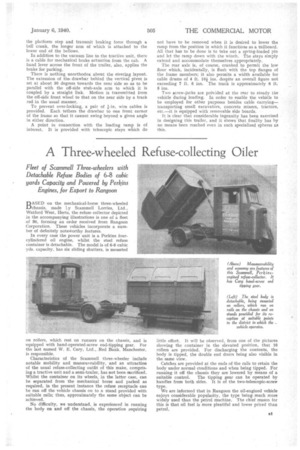Transit Insurance
Page 27

If you've noticed an error in this article please click here to report it so we can fix it.
Becomes a Vital Necessity
For Present-day Haulage Requirements Suitable Insurance is Obtainable Without Difficulty at Reasonable Rates
IT is little more than 10 years since insurance companies were first called upon to cater for hauliers in • respect of goods-in-transit, the onginai purpose being to afford cover with regard to legal liability only The eventual trend was towards a more comprehensive cover, and, nowadays, it is generally recognized that haulage contracts cannot be obtained tmless the haulier be in possession of a policy of insurance which gives really adequate protection.
Underwriters have not been slow in appreciating present-day requirements and suitable insurance is obtainable without difficulty at reasonable rates of premium. It may • happen that the documents of the various insurance companies differ considerably, so far as actual form and wording are concerned, but, when condensed, they show that the cover provided is more or less identical in all cases.
Underwriters Let Down by Hauliers This class of insurance is still in the experimental stage and underwriters have, for many years, been feeling their way gradually. It is unfortunate that, in the past, before road transport was at all .organized, they were let down by certain of the small concerns of haulage contractors, some of which were unable to pay their way or their premiums.
Also, claims were frequent, and the result was that many abandoned this type of insurance as uneconomic and unsatisfactory. Only a few have re:entered the market, generally with schemes based on their past experience.
The form of insurance at present most widely in use is the annual polky, a document for a fixed amount per load per vehicle. This is a direct development of the block policy often used in the marine business, being so favoured because of its extreme simplicity in so far as it obviates the necessity of specific adv-ices being made in respect of different interests carried. This is not so in the case of the declaration policy.
• The declaration policy was, originally, put forward by underwriters as
the ideal document, because it had proved satisfactory for merchants consigning goods by rail, but it was soon realized (so far as the carrier was concerned) that this was too unwieldy, because the loads dealt with were so varied in description and value. This alone made the rendering of declarations practically impossible, and call was made for a more suitable form of insurance.
A good compromise then appeared in the freight policy, under which it was necessary for the insured haulier to render service, from time to time, of the amount earned by him in respect of goods carried at his risk.
In point of fact, this type of insurance is still carried on by numerous concerns in preference to the annual policy. It is of particular advantage to the clearing house, which passes over practically all the loads to the subcontractors, who have their own insurance arrangements, thus avoiding double insurance, with a consequent saving of premium.
Additional Contingencies Now Well Covered The risks of fire and loss, or damage resulting from an accident to the vehicle, constituted the original cover granted in respect of road transport, but, in course of time, the inclusion of additional contingencies was called for and underwriters responded accordingly. Nowadays. such risks as damage by rainwater or theft and pilferage, and even breakage of brittle articles, such as glass and china, can be insured against.
It is only to be expected that the insertion of certain "exclusions" in the policy is necessary to protect the insurance company from claims of an ambiguous nature, but these are relatively unimportant and not of any serious consequence to the average haulage contractor. For
example, few are affected by the exclusion of bullion, etc., or explosives.
• At one time raw cotton and grasses were debarred from the contract, but this was when steam-driven vehicles were commonplace and the risk of fire in transit more imminent. Cover for such interest is now to be obtained Without difficulty.
An exclusion which recent events have shown might seriously affeci road transport is that of the war risk. There is a national agreement, between underwriters, that insurance for such a contingency will not be granted in respect of any land transit. but, fortunately, it is still possible to insure against the more probable risks of damage by strikers or to other labour disturbances.
Probably, in the event of this country being involved in a European war at some future date, a suitable insurance scheme will be put forward, perhaps with Government aid. In the meantime, 'nothing can be done about it. • The Reason for the Cancellation Clause
The cancellation clause appearing in nearly every policy is, to a certain extent, the result of the insurance companies' former indifferent experience of this type of business. as they are loth to be committed for 12 months without the option of cancelling, if circumstances prove it
advisable. .
The fixing of premium is probably one of the most difficult tasks for an underwriter, and, in this matter, his point of view is not always appreciated. Take as an example the annual policy in which a limit of liability per load is fixed. There is no restriction as to the number of loads a vehicle may take, so the aggregate liability is unassessable, but the underwriter must, at the outset, fix a rate which is definitely attractive, and this to be so must be as low as possible.
To realize the position fully, it is necessary for the haulier to consider only his own insurance policy, together with the premium paid, and he will be surprised how fractional the cost per load works out. E.V.












































































